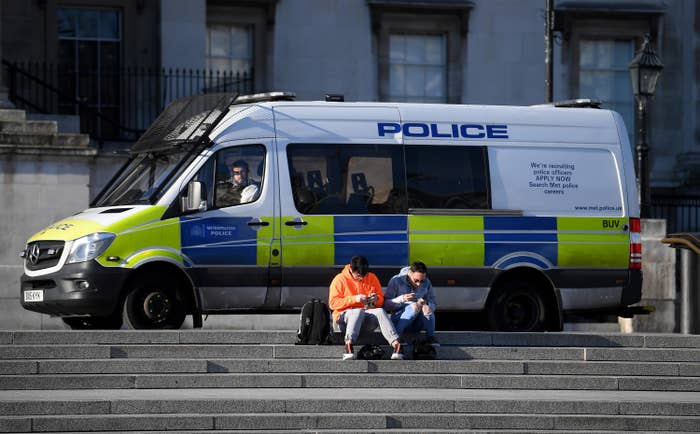
The journalists at BuzzFeed News are proud to bring you trustworthy and relevant reporting about the coronavirus. To help keep this news free, become a member and sign up for our newsletter, Outbreak Today.
The government has given police new powers to make sure everyone is following the rules of the dramatic lockdown that Boris Johnson ordered earlier this week to combat the spread of the coronavirus.
There have been a few rumours flying about — no, you won't get paid £150 for snitching one someone — so here is all you need to know about the new powers police have to keep people inside.
The government has said that nobody can leave their houses — but there are some exceptions.
It is still okay to leave your house to pick up food and medical supplies — including for pets, for your household, or to help out a vulnerable person, but everyone has been asked to do this only when it's strictly necessary.
Exercising alone or with members of your own household is allowed once a day, and leaving the house is okay if it's for a medical reason, to donate blood, or if you're helping out or caring for someone vulnerable.
Everyone is also allowed to travel to work or to provide voluntary services — but only if these cannot be done from home.
It's also okay to go out to attend court, answer bail, or take part in other legal proceedings, or to leave home to access public services such as social services, the job centre, victim support, or to take a child to school if it is necessary to do so. Parents with shared custody arrangements are also allowed to continue these.
Weddings and other celebrations have been cancelled, but funerals are still taking place. People are allowed to attend these if the person who has died is a member of their household or immediate family — or if none of those people are attending, it's okay to attend the funeral of a friend. Ministers of religion are also allowed to travel to their place of worship.
The government has also said it's okay to move house where reasonably necessary — but has asked buyers who haven't already sealed the deal to put their completion dates on hold. And it's also fine to leave your house to escape illness and injury or to avoid risk of harm.
This is who the government has classed as vulnerable people.
Vulnerable people — who have been advised to adhere strictly to the social distancing guidelines for 12 weeks — include anyone over 70 and pregnant people, as well as people with long term health conditions.
These include chronic kidney disease, heart disease, liver disease, and respiratory diseases, and people with neurological conditions, such as Parkinson’s disease, motor neurone disease, multiple sclerosis, a learning disability, or cerebral palsy.
They also include people who are diabetic, who have problems with the spleen, such as sickle cell disease, and people with a weakened immune system as the result of conditions such as HIV and AIDS, or because they have undergone medical treatment such as chemotherapy. Anyone seriously overweight, with a body mass index of 40 or above, is also classed as vulnerable.
There is nothing in the laws to say how many times or how far away from home you can exercise.
In his address to the nation, Boris Johnson said that people should only leave the house once a day to exercise — for a walk, or a run, or a cycle, for example.
Government guidance on exercise is very clear:
- stay local and use open spaces near to your home where possible – do not travel unnecessarily
- you should only go outside alone or with members of your own household
- keep at least 2 metres apart from anyone outside your household at all times
The new legislation doesn't specify that you must only exercise once a day, or only close to home, or for a specified amount of time. However, police have asked people to use their common sense — and you can still be fined if they think your actions could risk making the outbreak worse.
"This is a national emergency, not a national holiday," Martin Hewitt, head of the National Police Chief's Council, told the BBC.
"Where we do not want to get to, as we approach a weekend, is places of natural beauty being absolutely packed with people coming and going in the same car park and the potential to spread the virus," he said.
There are also restrictions on gatherings.
Public gatherings of more than two people (unless everyone is from the same household) are not allowed, so no picnics or barbecues in the park — and police have also been breaking up house parties, even though the gatherings aren't public.
The only public gatherings that are permitted are funerals, essential work events, and things like legal hearings, house removals, and people providing care or emergency assistance — pretty much in line with the restrictions on movement.
Breaking the regulations is punishable with a fine.
Anyone who breaks the rules will be issued with a fixed penalty notice of £60 —reduced to £30 if it's paid within 14 days. However, if they then go on to get a second one, the fine will be double at £120, and each subsequent fine will double up to a maximum of £960. Anyone who does not pay can be taken to court — and if they still refuse, police can arrest them.
The police can also break up gatherings, and return people to their homes — and they can use reasonable force if necessary. PCSOs will have the same powers.
Police officers will also be able to take children found breaking the rules back to their parents or guardians — and tell parents to do all they can to stop their offspring from breaking the rules.
But there are no rewards for reporting other people.
Since the new Act was announced, there have been dozens of tweets claiming that the government will reward individuals £150 if they report someone who is in breach of lockdown rules — such as going outside more than the allocated once a day.
£150 to report someone outside?? Me:
No such incentives are mentioned anywhere in the legislation, so you can kiss goodbye to any hopes of earning some quick cash for snitching.
It’s not clear where the rumour came from, although systems of reward and punishment are said to have been used elsewhere to encourage citizens to adhere to social distancing rules. Some cities in China, for example, were reported to be offering people cash for informing on sick neighbours.
The new powers will be in place for six months.
They came into force immediately on Thursday and will be reviewed every three weeks.
Home secretary Priti Patel said: “All our frontline services really are the best of us and are doing an incredible job to stop this terrible virus from spreading. That's why I’m giving the police these new enforcement powers, to protect the public and keep people safe.”
Do you have questions you want answered? You can always get in touch. And if you're someone who is seeing the impact of this firsthand, we’d also love to hear from you (you can reach out to us via one of our tip line channels).


